After a three-hour drive from Bangkok that started at 5am, we were excited to meet the CEO and CFO at the plant of a small manufacturing company which our initial research indicated to be a promising investment. We were escorted into a conference room with shiny personalized name tags and enticing local pastries.
We typically request to start our meetings with Q&A as we find that it is far more valuable than listening to the polished canned presentations that companies feed most investors. We rarely get pushback on our request, but this CEO ignored it and launched into a spiel about how busy his firm has been this year. After asking a couple more times if we could proceed to our prepared questions, the CEO said there was a client in the office that he urgently needed to attend to and vanished less than 10 minutes into the meeting.
Unable to answer our questions, the CFO also excused himself a few minutes later and left us sitting in the conference room alone for 45 minutes. Unsure of whether they would return, we started wandering the halls and ran into the plant manager. We told him we were hoping to tour the plant, and he happily agreed to show us around.
The place was a ghost town. No machines running and no employees in sight. When we asked where the workers were, the manager explained that production has been very slow lately, as exports have dried up due to the recent appreciation of the local currency. Disheartened, we returned to the conference room to eat the pastries before our three-hour ride back, only to find an army of ants working on them. At least the ants were busy that day.
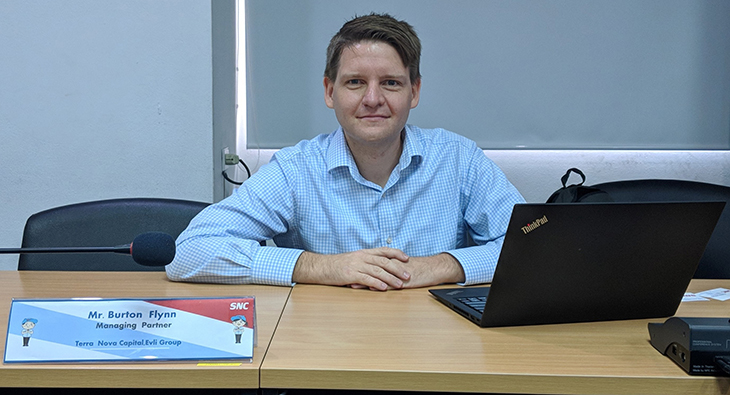 Sitting in an empty conference room at the plant of a €100m air conditioning parts manufacturer
Sitting in an empty conference room at the plant of a €100m air conditioning parts manufacturer
Taking a road well covered
As we were driving back, we actually did not feel disappointed – quite the opposite. Our due diligence prevented us from investing in a company which looked good on paper, but which would have been a disaster. In a good mood, we were therefore quick to notice that the road we were driving on was of great quality: the asphalt felt very smooth.
Coincidentally, our next meeting happened to be with a company which produces asphalt for this and many other roads in Thailand which we enjoyed testing during our month in the country. The meeting with the CEO started in a very different way from the previous one: there were no personalized name tags and no sweets awaiting investors. Luckily, there were no insects either, and the CEO did not abscond.
What this company did have were growing earnings, cheap valuation, and promising future opportunities. A leader in the asphalt industry, the firm expects strong volumes and increased selling prices as a result of the IMO 2020 regulation which will create supply tightness over the coming year. The business additionally stands to benefit from the upcoming government stimulus package to include new infrastructure projects. Yet despite this growth potential, the company offered an attractive valuation at 13x P/E. Finding this investment was like finding a needle in a haystack, given that most Thai companies we met are currently trading at above 25x P/E.
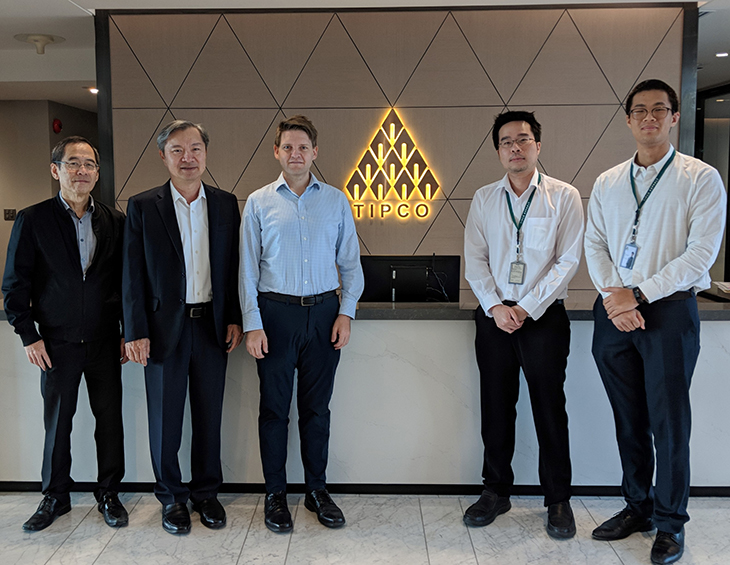 Meeting with a €1b asphalt company
Meeting with a €1b asphalt company
Talking stocks with Stotz
We spent an entire month in Thailand, setting our monthly record by meeting 90 companies’ CEOs and other senior management, as well as some of their board members and investors. Enhancing our macro understanding of this country whose currency appreciated 8% over the past year, we also met with the local stock exchange executives; central bank leadership; and former central bank governor, finance minister, and deputy prime minister.
Diving deep in the Thai market during this busy month, we had lunch with a royal family member, learned “the local Warren Buffett’s” stock-picking secrets, discussed ESG and investment research with professors at the two leading business schools, talked stocks with Dr. Stotz over pad thai and mango sticky rice, attended the local CFA society’s event about the future of investment management, and met with some of the largest Thai public and private equity investors. Additionally, we toured one of the world's largest cinemas and attended their management company’s quarterly results announcement held in a movie theater where they served popcorn (which generates margins of over 70%).
At the kind invitation of the Wharton Club of Thailand, we also participated in an event focused on U.S. foreign policy impact on economic and geopolitical developments in Asia, learning how local companies will be affected by the U.S.-China trade war – a matter that was named by most companies we met as a threat to their stability and profitability.
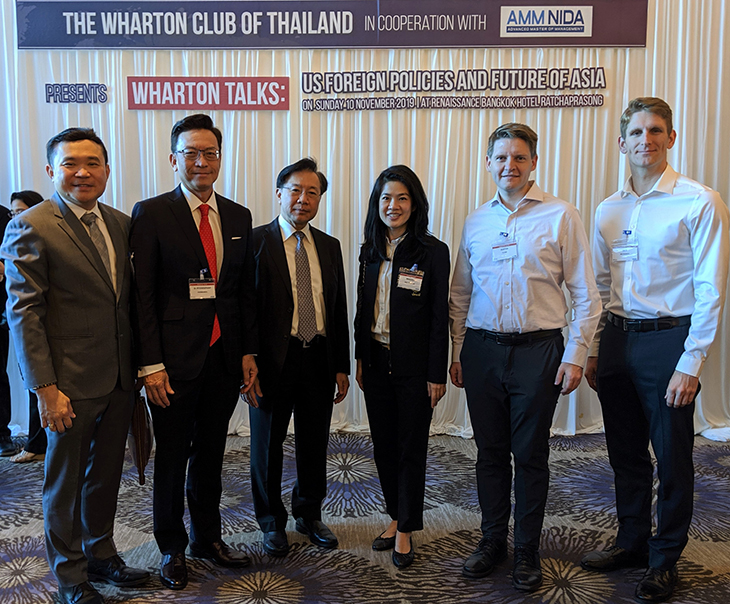 Burton Flynn and Ivan Nechunaev networking with Thai business leaders at a Wharton Club of Thailand event
Burton Flynn and Ivan Nechunaev networking with Thai business leaders at a Wharton Club of Thailand event
Due diligencing metro lines and toll roads with our own asse(t)s
Most markets we invest in have a common problem: their currencies are getting weaker. Thailand also has a currency problem... its baht is getting stronger. Similar to the company with an empty factory that we met, many other exporters in Thailand, including the tourism industry which accounts for 20% of the GDP, have been suffering from the strengthening currency. As a result, there is a slowdown in economic growth leading to borderline deflation. Additionally, foreign currency inflows seeking attractive yields exceed outflows, and consistent current account surplus keeps strengthening the currency.
Given these factors, we are very hesitant to invest in any exporters and would rather focus on domestically oriented businesses and infrastructure spending beneficiaries. Such beneficiaries include listed metro and toll road operators, which we not only met, but whose assets we spent countless hours “due diligencing” in between meetings. Given the oftentimes standstill traffic – the worst we’ve experienced in any market (even before being exacerbated for a few days during the Pope’s visit) – public transportation and toll roads were often the only reason we made it to our meetings on time.
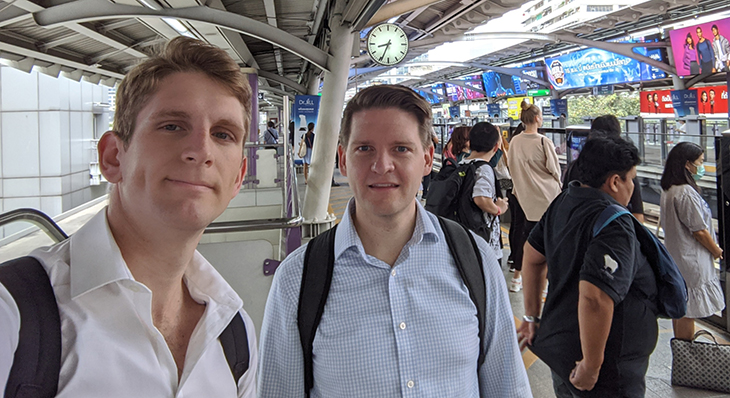 Using public transportation to get to our meetings
Using public transportation to get to our meetings
Bookworms
We love reading books on investing and have a small collection in our office. While visiting the Thai stock exchange, we discovered the most impressive library of investment books. The Maruey Library houses 18,000 books separated into 17 sections such as Fundamental Analysis, Corporate Finance, and Economics. The annual membership fee of €3 allows its 5,800 members to borrow books for 7 days. We felt like kids in a candy store. Next time we travel to Bangkok we will make sure to schedule a few extra days to camp out here.
In a meeting with the CEO of a leading restaurant company, we learned that aside from being a billionaire and running the company he loves to read. So much in fact that he has a library in his office which houses the 10,000 books he’s read, with the date he read it written inside every single one. According to him, we are the first investors to have seen his library. In fact, we only learned about this when we asked “What do you love to do?”, a personal question we ask every CEO we meet. Another question we ask is "What's your purpose?" To this CEO, it's not about money anymore; being a millionaire and a billionaire are the same to him. His personal objective is to live a peaceful life: maintain good health, be free from chaos, and read.
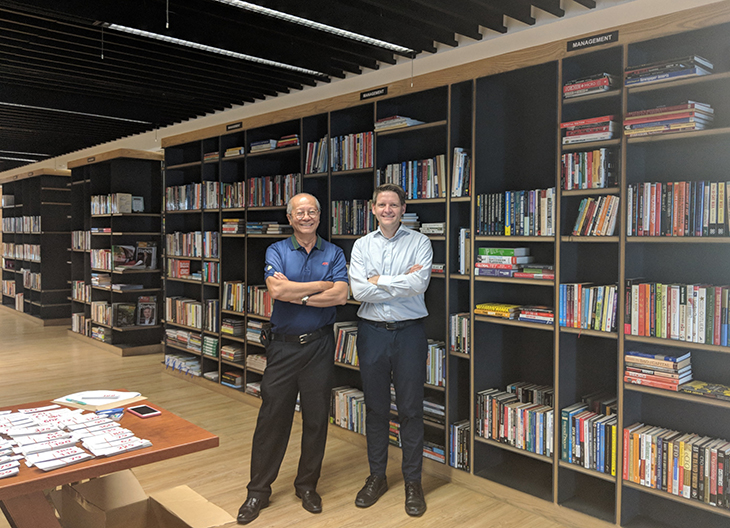 Visiting the library of the CEO of a €2b restaurant company
Visiting the library of the CEO of a €2b restaurant company
The opportunity to interview dozens of CEOs every week is one of the favorite parts of our job. We spend about a fourth of our meetings asking personal questions to learn their stories and what makes them tick, as well as their normal routine and what they are hyper-focused on right now. These meetings are not only fascinating and inspiring, they help us understand who’s running the businesses we're investing in.
An insulation company’s CEO shared with us how his father came to Thailand from China as a poor man and opened a small factory. The son continued the business and after dozens of years of hard work now leads a company that’s in the top 5 in its industry globally. Keys to this CEO's success? "Take good care of the people, never stop learning, read a lot, and exercise". The CEO (who has 30 patents under his name) shared with us two books he wrote – one on Chinese economy and one on his career – and we will gladly read and add them to our office collection.
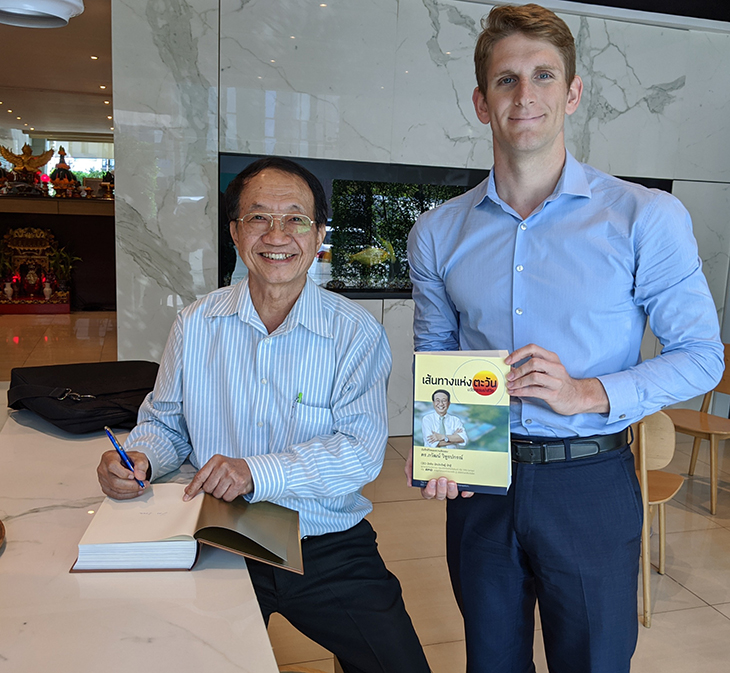 Receiving books authored by the CEO of a €600m insulation company
Receiving books authored by the CEO of a €600m insulation company
Best ESG in the world?
We explain to all companies that our investors in Finland know that we cannot simply apply Scandinavian standards to emerging markets like Thailand. Most managers are eager to agree with this sentiment. But the asphalt firm mentioned earlier actually challenged us on this statement and argued that Thailand is not only one of the best emerging markets when it comes to ESG, but is arguably one of the best in the entire world. They pointed out that out of 60 industry leaders worldwide identified by the Dow Jones Sustainability Index, 8 are located in Thailand, the second largest number behind the U.S. which has 12, despite Thailand having only 5% of the number of listed companies that the U.S. has.
ESG champions that make Thailand among the world’s best in ESG impressed us with their timely understanding of long-term business risks. One bank communicated to us that they recently identified five emerging risks for the bank, among which is climate change. The bank’s credit team gathered climate change-related financial data, ran scenario analyses on it, and convened a round of internal meetings to decide how to minimize relevant business risks going forward – and very long forward at that: “What will happen to our credit portfolio in 50 years?” was the question they asked. This bank also offsets greenhouse gas emissions, actively reduces waste, provides financial knowledge to underprivileged communities, and is the first and only Thai constituent of the Bloomberg Gender-Equality Index.
Another company doing something innovative on the ESG front was an airline which created a community-based tourism campaign whereby customers can book travel to rural Thailand, stay with locals, and support indigenous communities. Items made by these communities are also sold onboard. Rural people are supported financially and improve their standard of living while staying at home in their villages, instead of having to go work in expensive Bangkok where they are often marginalized. At the same time, the tourists learn more about the local cultures and support their preservation.
What enables Thailand to foster best-in-class ESG companies? Part of the ecosystem is certainly the open-minded Thai culture that embraces inclusivity and diversity of ethnicities, genders, and religions. A media company we met which produces the local CNBC channel as well as original content was a vivid example of this pluralism: the company’s head whom we met is the first transgender CEO in the country.
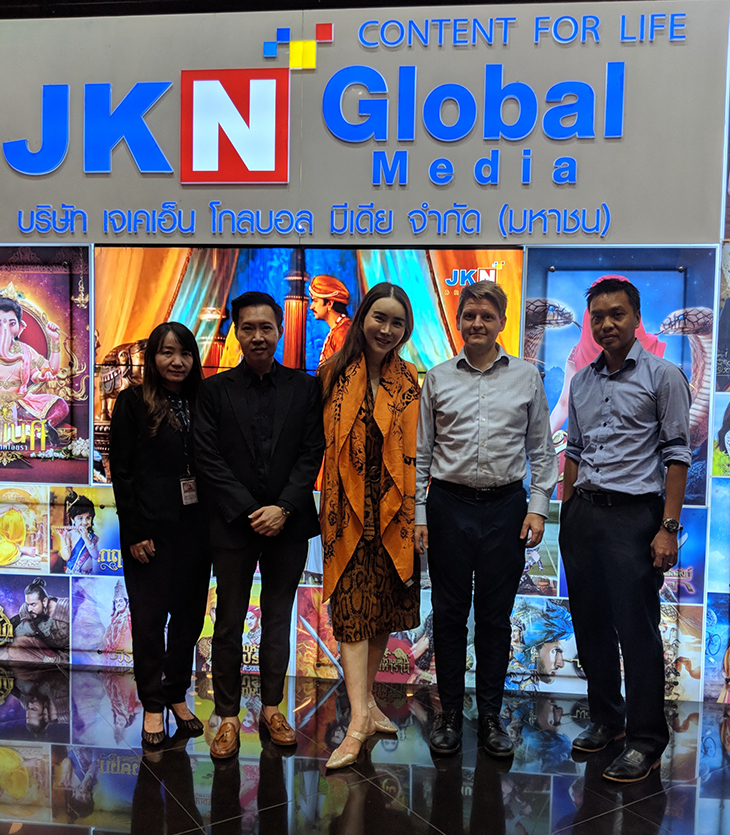 Meeting with the “ladyboy” CEO of €80m media company
Meeting with the “ladyboy” CEO of €80m media company
“Brownwashing”
We ask every company we meet about their ESG practices and climate change preparedness plans. While some companies admit that they don’t have any yet (and we appreciate this honesty) and some explain what they are doing to improve their ESG standards, most immediately start boasting about all the ESG awards they have received. Interestingly, despite having won so many accolades many cannot articulate what makes their ESG policies particularly sustainable and superior to their peers’. We suspect some of these are so-called “pay-to-play” awards whereby companies are invited to nominate themselves for a fee of up to €1,000 for which they receive an invitation to a fancy gala dinner where the “winners” are ostentatiously proclaimed.
After asking the same ESG questions to hundreds of companies over the past few months, we have improved our skill of recognizing “greenwashing”, a practice whereby companies portray themselves as more environmentally and socially responsible than they actually are in order to enhance their marketing appeal and boost valuations through promotional green messaging. However, we get very excited when we find companies which engage in a practice we affectionately refer to as “brownwashing”. Such companies have ESG practices ingrained in their DNA, and while they may not be able to articulate their ESG policy, their mission, culture and ways of doing business demonstrate their inward commitment to sustainability.
The 35-year old female CEO of one such fruit juice manufacturing “brownwasher” who didn’t know what ESG meant until we explained the acronym said they don’t have a separate policy but rather try to build sustainability into everything they do because it’s not effective to set a policy separate from the operations. They look for “win-win-wins”. For example, they recently set up a new R&D company which turns waste from their core business into value-added products such as probiotics and cosmetics binder. This not only makes the environment and shareholders better off, the company is able to pay higher prices to the farmers, giving them a better quality of life while securing necessary supply. Another example is the new PET machines they recently purchased which clean bottles during the plastic molding process rather a washing them afterwards. Despite these being slightly more expensive than traditional machines, this process uses less chemicals, energy, and water, which reduces ongoing operating costs.
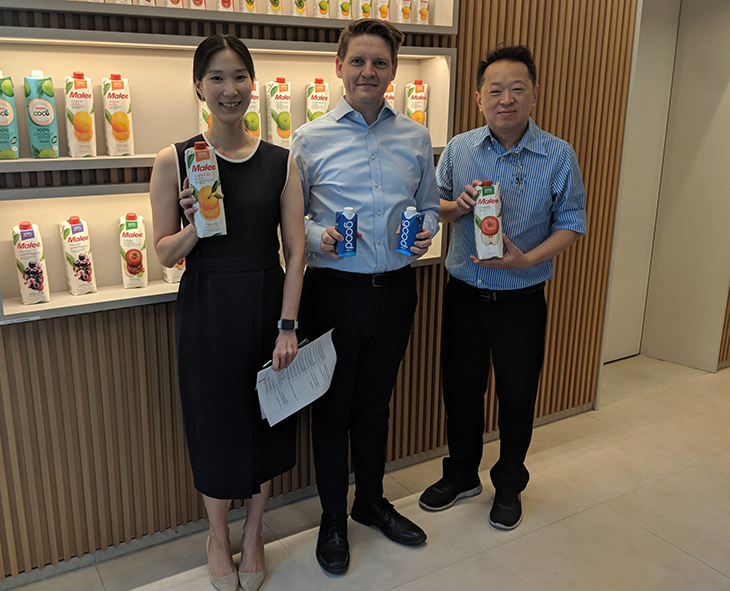 Meeting with the CEO of a €60m juice manufacturer and holding water packaged in recycled coconut waste
Meeting with the CEO of a €60m juice manufacturer and holding water packaged in recycled coconut waste
Email from the CEO
We try hard to raise ESG awareness and we get excited when companies appreciate our ESG engagement efforts. The CEO of a brassiere company (which administers the Sewing Cup Sewing Heart campaign incentivizing customers to help sew 20,000 customized bras donated to breast cancer survivors each year from kits the company provides) sent us this email following our meeting:
"Thank you for visiting our company today and we also really appreciate your questions, especially the ESG issues in which none of the funds have ever played an interest over the past years. Really, we have met hundreds of fund managers and research analysts in Hong Kong, Kuala Lumpur, Bangkok, and Singapore since 2017, and your company is the first which has focused on ESG issues."
We are happy to often be the first investors to have a serious conversation about ESG with companies in emerging markets, but we hope to see more and more funds focus on critically important sustainability issues.
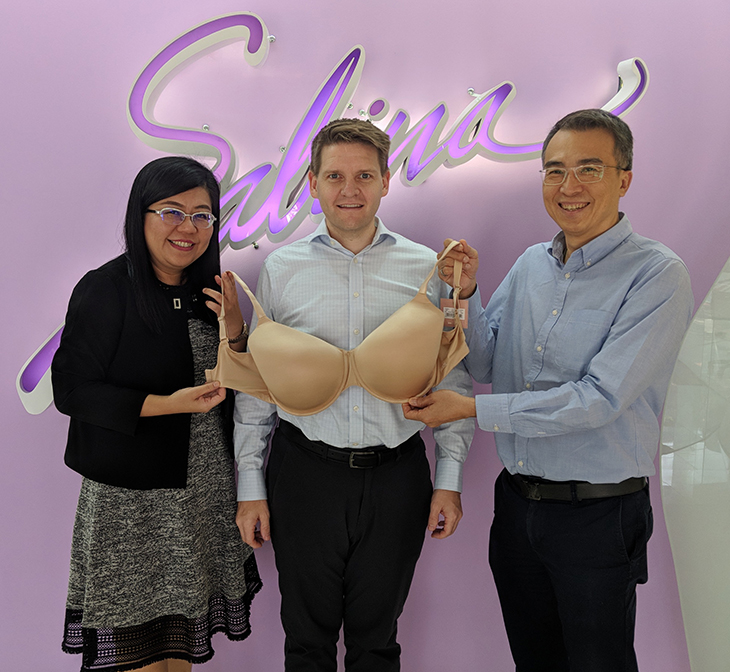 Meeting with the CEO of a €300m brassiere company
Meeting with the CEO of a €300m brassiere company
Our next stop
Having spent a month in each – the Philippines, Malaysia, Indonesia, Bangladesh, Pakistan and Thailand – we are departing to the seventh country in our effort to live in 12 emerging markets in 12 months. Stay tuned for... Vietnam.
Learn more about our Evli Emerging Frontier Fund
Our recent blogs
A month in Pakistan: An altercation at the ministry of finance
A month in Bangladesh: We're investing billions in the world’s best stock market
A month in Indonesia: Offending Trump in Bali
A month in Malaysia: Finding another gem on "Treasure Island"
A month in the Philippines: How active management helped us beat the traffic (and the market)












